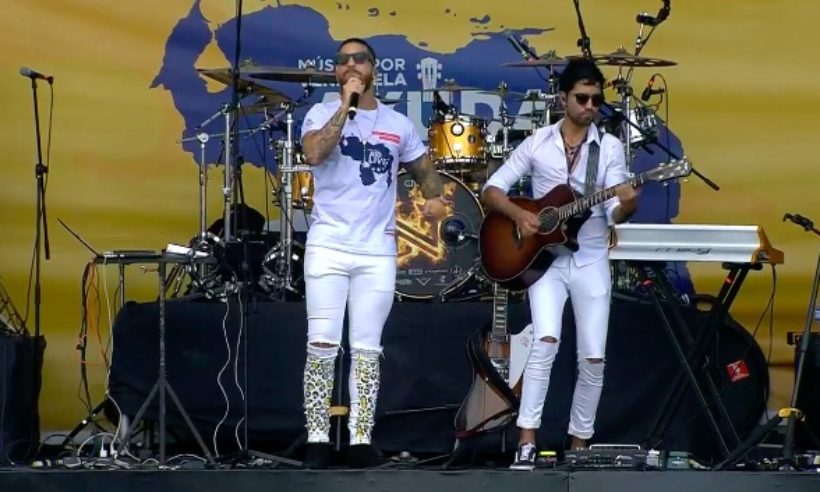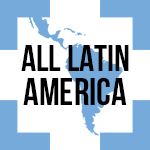A massive all-day concert, “Venezuela Aid Live,” is underway today in Colombia, featuring a star-studded lineup that gathered to raise resources and put further pressure on Venezuelan head of state Nicolás Maduro to accept international humanitarian aid for the tens of millions of citizens in the socialist country suffering from food and medicine shortages.
Today’s free concert in the large border city of Cúcuta, which is backed by English billionaire mogul Richard Branson, was expected to last more than seven hours and include performances from major Spanish-language artists including Maluma, Alejandro Sanz, Luis Fonsi, Carlos Vives, Juanes, Fonseca, Paulina Rubio, Nacho, Chyno, Maná, Silvestre Dangond, Reik, Santiago Cruz, and Cholo Valderrama.
Among these artists and the rest of the lineup are musicians from Colombia, Venezuela, Spain, Mexico, Puerto Rico, Argentina, and more.
Photo: Maluma performing in Cúcuta during Venezuela Live Aid. (Image: Screenshot via VenezuelaAidLive.com)
Colombian President Iván Duque traveled to the city, along with Chilean President Sebastián Piñera and Paraguayan President Mario Abdo Benítez, to support the effort.
In a public ceremony during the concert, Duque personally signed documents granting Colombian citizenship to Nacho, whose real name is Miguel Ignacio Mendoza Donatti, and his wife. “We share a cause, a cause to bring freedom to your country,” said Duque to Nacho after formalizing his citizenship.
Branson was also on hand to address the capacity crowd full of both Colombians and Venezuelans. He has a stated goal of raising $100 million with this campaign, which is accepting donations through the website VenezuelaLiveAid.com.
“Let the music inspire and mobilize you,” said Branson, per the BBC. “United through music, we can make a huge difference and help bring an end to the needless suffering of millions.”

The South American nation has been spiraling downward for years as economic and social conditions deteriorate, with millions fleeing, often on foot, to Colombia and other countries across the region. More than one million Venezuelans are now living in Colombia, and the majority cross the border bridge that leads to Cúcuta.
Aid workers, medical treatment clinics, and soup kitchens are now seen across the city, where Venezuelans work menial jobs, sell candies and small trinkets (including the now worthless Venezuelan currency as souvenirs), and often sleep in local parks or on the street. Hyperinflation hit 80,000% last year in Venezuela, which formerly propped up its government subsidies and economic program with oil revenue but has failed to even be able to keep food on grocery store shelves or medicine in hospitals since the per-barrel price crashed in 2014.
A movement led by the political opposition and Venezuelan legislature leader Juan Guaidó, with backing from the United States, has been attempting to bring humanitarian aid to the country in recent weeks. But Maduro has blocked entry to any cargo, citing it as a guise to overthrow him from power and otherwise undermine his rule.
Last month, Guaidó was named head of the National Assembly. Highlighting that last year’s re-election of Madurowas fraudulent and that the constitution provides for the top legislator to assume power in such a situation where the presidency is vacated, he soon declared himself the legitimate leader of the nation, a determination formally supported by more than a dozen nations across the Americas.
The move was encouraged by officials in the United States, who quickly planned to begin bringing aid both to help Venezuelans and in an attempt to pressure Maduro to either allow the assistance into the country or give the appearance that he prefers retaining his grip on power over alleviating the suffering of his citizens.
In response to the overwhelming attention that Venezuela Aid Live has generated, Maduro quickly moved to stage his own competing concert on the other side of the border. The stunt has not received any significant support or the attendance of any major artists from outside the country.
U.S. officials have been making a very public display in recent weeks of transporting food, medicine, and other goods from Bogotá to Cúcuta, stockpiling it there. Republican U.S. Senator Marco Rubio of Florida traveled to the border city and has been among the loudest proponents of regime change in Venezuela. Following Guidó’s declaration that he is the nation’s new leader, Trump and other White House officials reportedly declined to rule of military action.
While popular support for Maduro has continued to fall in recent years, he still maintains control of the military. Efforts like this concert are intended to help splinter that support, further galvanize support for the opposition, and generally bring more global attention to the plight of those being hurt by the crisis.
“The courage of the Venezuelan people will lead the military forces to understand that they have to be on the right side of history and allow the entry of humanitarian aid,” said Duque today in a public address after arriving in Cúcuta.
Duque — aligning with the United States, Brazil, Argentina, and other heads of state across the hemisphere — has recognized Guaidó as the new legitimate leader of Venezuela. He also denounced last year’s re-election as illegitimate and last month called on Maduro to step down.
While those participating in the concert in Colombia are pushing for progress and celebrating the change they hope will come, the dispute over aid turned deadly yesterday on Venezuela’s border with Brazil.
According to a Washington Post report, two people died and up to a dozen others were injured when multiple members of the Venezuelan military opened fire on a group that was attempting to keep a section of the border open so that aid could be delivered.
The military personnel reportedly arrived at a border crossing in Kumarakapay, which had been ordered closed by Maduro the prior day in an effort to block any incoming aid, and members of the local community attempted to stand in front of and physically block their vehicles.
“Soldiers began firing assault rifles,” per the Washington Post, killing Rolando Garcia and Zorayda Rodríguez, a 42-year-old woman.
These were the first deaths reported related to the humanitarian aid stalemate that has been elevating since the United States began shipping goods to Colombia. Both U.S. President Donald Trump and Guaidó condemned the incident on Twitter yesterday, with the Venezuelan urging other military members to make a choice at this critical moment.
“To soldiers: between today and tomorrow you will define how to be remembered,” tweeted Guiadó. “We know you are with the people, you have mad it clear to us. Tomorrow you can demonstrate it.”
This article was originally published by Finance Colombia. It has been reprinted with permission.


